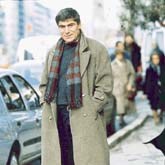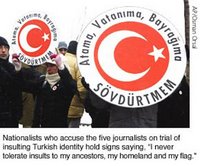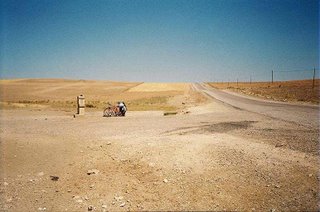Hrant Dink's solitude
 Hrant Dink, an Armenian editor, columnist, journalist, thinker from Turkey is assassinated yesterday. Within left progressive and pro-democratic forces in Turkey, Dink occupied a unique place. His perseverance, especially, in the face of the travesty of unending court trials and delusory accusations he was subjected to, more recently under the infamous Article 301, evokes an admiring and a guilty puzzlement. Unfortunately, it is Dink's loss that compels this state of puzzlement into a deliberation of the immense significance and singularity his position embodied.
Hrant Dink, an Armenian editor, columnist, journalist, thinker from Turkey is assassinated yesterday. Within left progressive and pro-democratic forces in Turkey, Dink occupied a unique place. His perseverance, especially, in the face of the travesty of unending court trials and delusory accusations he was subjected to, more recently under the infamous Article 301, evokes an admiring and a guilty puzzlement. Unfortunately, it is Dink's loss that compels this state of puzzlement into a deliberation of the immense significance and singularity his position embodied.Dink struggled against the nationalist denialism around the Armenian genocide and discrimination of Armenian community in Turkey (whose numbers dwindled to something between 50.000-80.000). However, he refrained from simply advocating "positive rights" for the Armenians, an approach that he argued to have led to the isolation of the Armenian community as a minority that needs (international) protection. Rather, he assumed a "negative rights" approach, meaning, he revealed the exclusions of Turkish citizenship at the same time that he engaged in practices of constituting the excluded Armenian community as citizens of Turkey. By remarking on the general precariousness of rights in Turkey, he also pointed to the shakiness of the majority/minority distinction. I think such interventions universalized Dink's position beyond the defense of Armenian rights to addressing more broadly the important issue of rethinking of citizenship in Turkey.
With equal commitment, Dink critiqued the politics of ressentiment that continues to structure the Armenian identity. He was at times critiqued by certain tendencies within the Armenian community, the religious institution of Patriarchy in Turkey as well as by the Armenian state and segments of diaspora. His nuanced stances were regarded too controversial or wrongly equated to the assimilation of the Armenian identity. Thus, on the one hand, his position was not quite fully embraced and remained inarticulate. On the other hand, he was tortured at the hands of Turkish nationalism for "denigrating and insulting Turkishness," and, eventually, eliminated. This solitude of Hrant Dink attests to the fact that he was the voice and living practice of some truth, which was hard to assume and digest, but all the more necessary not to be lost.
In the aftermath of the killing, the politico-legal-military state apparatus in Turkey circulates the memorized narratives of condemnation and condolence. Military general Yaşar Büyükanıt's awaited statement, "today's bullets were targeted to Turkey," finds its reflection in the familiar rhetoric of the prime minister, Tayyip Erdoğan, "the dark hands that killed him will be found and punished." These soulless declarations shoulder each other to reduce Dink's murder to an affair of national security, at the same time, repressing and subtracting the responsibilities of the establishment from its eventuating. They forestall the acute need to understand why this event happened. Performing a feigned remorse, they try to suppress the obscene fact that it was only a few days ago that Dink himself was ruthlessly attacked as being part of those dark forces, for allegedly threatening national unity and solidarity.
Clearly, the "Turkey" that the nationalist state ideology imagines to be targeted by yesterday's bullets has nothing in common with Dink's understanding of "Turkey."
 This is the reason why he is murdered. This is the reason why he walked the courts for three years before his first acquittal from the charges of insulting "Turkishness," because he defined himself in some conference in 2002 as being "not a Turk, but from Turkey and Armenian."
This is the reason why he is murdered. This is the reason why he walked the courts for three years before his first acquittal from the charges of insulting "Turkishness," because he defined himself in some conference in 2002 as being "not a Turk, but from Turkey and Armenian."Dink's claim inspires a notion of citizenship, whose attachment is to a certain place and geography, rather than to a pure identity. Yet, there is also a certain understanding of historical attachment that flows through such a material space, which Dink did not want let go of. This history, though, does not correspond to a recuperation and keeping alive some lost (Armenian) ideal. Indeed, while Dink claimed that he was an Armenian and from
 Turkey, and while he fervently criticized the Turkish official history, he also repeated the need to detach the Armenian identity from the weight of historical memory, the "residues of the past," and, instead, refocus on the living Armenian community.
Turkey, and while he fervently criticized the Turkish official history, he also repeated the need to detach the Armenian identity from the weight of historical memory, the "residues of the past," and, instead, refocus on the living Armenian community.Reading Dink's claim "being from Turkey and an Armenian" might also call forth another historico-spatial imagination of Turkey, more properly, of Anatolia, as 'the mosaic of cultures,' a prevalent multiculturalist idea of citizenship that both progressive and conservative thinking at times embrace as an alternative to the ethnocentricism of Turkish nationalism. In this ideology, Turkish citizenship encompasses many different cultures, and identities, Turkish, Kurd, Armenian, Greek, Cherkes, Abkhaz, and so on. I think that Dink's position was far from such an ideal of reinserting into contemporary context previously defined and bounded identities that were presumed to once coexist harmoniously in Anatolia. It rather seems to me that what Dink's unique and dangerous project embodied was reclaiming and redefining an Armenian identity as an intimate condition of redefining what it means to be a citizen of Turkey and vise versa. Agos, the bilingual newspaper that Hrant Dink established is perhaps one such new space, one of the main institutions for such a reconstruction and reclaiming. While Agos will continue its life, it is not so certain that Hrant Dink's place will be filled.
Labels: citizenship, hrant dink, post-nationalism

1 Comments:
i could not help but thinking about viola swamp's earlier post 'as one ras rolls, another steps up' when reading this 'solitude' and in general about dink's killing. eichman's and saddam's trials and killings were similar to eachother in what they skillfully left in abeyance, if nothing else. why did it happen? why the iraqi, why jews? why the germans, americans? what was the role of other nations? what was the extent of co-responsibility on the other side of the ‘allies’? that arendt asks at the very beginning of her trial report. all deaths that are used to obscure life's realities, are they not somewhat all alike? i just hope dink's death will not only feed the feud but will help posing the right questions, before it is (let to be) eventually forgotten.
2:51 AM
Post a Comment
<< Home